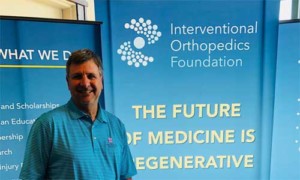 Dr. Mike Voight, the leader of our rehab team at NHI, is attending the Orthobiologics Annual conference in Denver. This conference is attended by 400 Medical professionals who are there to review 2018 state of the science in regenerative medicine.
Dr. Mike Voight, the leader of our rehab team at NHI, is attending the Orthobiologics Annual conference in Denver. This conference is attended by 400 Medical professionals who are there to review 2018 state of the science in regenerative medicine.
Regenerative medicine is a relatively new field that brings together all kinds of experts in biology, chemistry, computer science, engineering, and genetics. It is a broad field that includes tissue engineering but also incorporates research on how the body can self-heal. Self-healing of the body happens when the body uses its own systems, sometimes with help foreign biological material to recreate cells and rebuild tissues and organs. Regenerative medicine seeks to replace and rebuild damaged tissue or organs. The clinical strategies of the past focused primarily on treating the symptoms of the damage but with regenerative medicine, the body can use its own systems to help it heal.
The substances that orthopaedic surgeons utilize in regenerative medicine to help bodies self- heal more rapidly are called Orthobiologics. These products are made from substances that are naturally found in your body. Orthobiologic therapies harness cells and proteins naturally found in human biology to help support efficient regrowth of musculoskeletal tissues, including cartilage, bone, tendons, and ligaments.
Breakthrough orthobiologic therapies have helped to improve the long-term health of patients suffering from disabling musculoskeletal disorders and injuries. The development of orthobiologic solutions for repairing cartilage and bone has given surgeons an alternative to offer their patients instead of surgery. They are also used in conjunction with orthopaedics surgeries to aid in bone grafting and tissue regeneration to accelerating healing and improving lives.
The practitioners at NHI have used PRP, stem cells and other biologic materials in the clinic to treat hip arthritis and abductor tendon damage. They have also been used in surgery to treat avascular necrosis of the femoral head and subchondral cysts.
Location
2004 Hayes Street
Suite 700
Nashville, TN 37203
Office Hours
Monday-Friday:
8:00 am – 5:00 pm